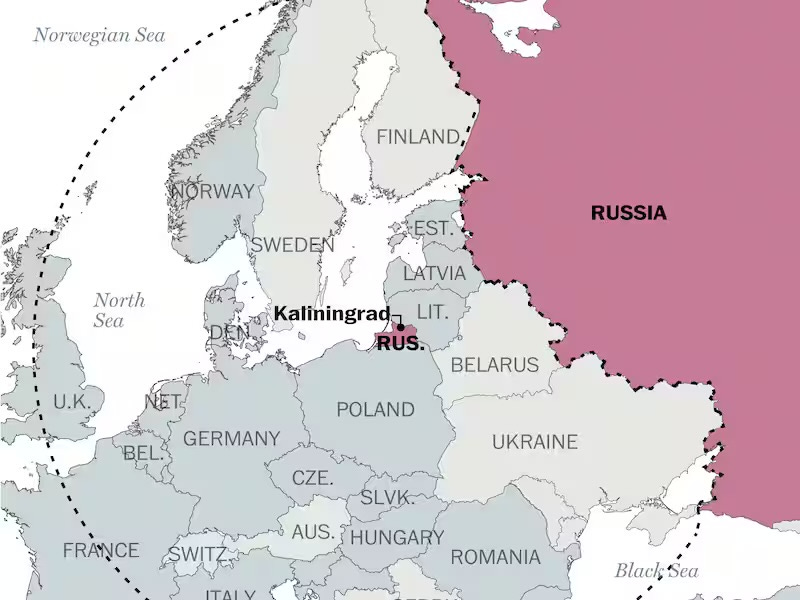If you pull up a modern map of Europe, you’ll notice a weird little chunk of land on the Baltic Sea that seems… out of place. That’s Kaliningrad, and it’s been part of Russia since 1991. But if you’re paying attention, you’ll realize—it’s not actually connected to Russia!
So, naturally, you might be wondering: why does Russia even have Kaliningrad, and how did they end up with it?
Let’s start at the beginning. The city at the heart of this region wasn’t always called Kaliningrad—it used to go by the name Königsberg. Back in the 13th century, it was part of the lands ruled by the Teutonic Order.
Fast forward a few hundred years to the 1500s, and Königsberg became the main hub of a new state called the Duchy of Prussia, which was basically a puppet of the Polish-Lithuanian Commonwealth.
It didn’t stay that way for long though—Prussia eventually broke away and crowned its first king right in Königsberg. Over the next few centuries, the area kept growing in importance, and by the late 1800s, Prussia (with Königsberg in it) had become the dominant power in the new German Empire.
While it wasn’t the capital, Königsberg had a pretty special status—it was a cultural center and home to the empire’s ruling family.
So here’s the big picture: for about 600 years, Königsberg and the surrounding region were mostly German, though there were also plenty of Poles and Lithuanians living there too. That didn’t really change until after World War I.
When the Treaty of Versailles came into play in 1919, Germany lost a bunch of territory, including parts of East Prussia. They kept Königsberg, but it became a kind of island—an exclave—cut off from the rest of the country.
Around this time, Lithuania was given some of the land nearby. Then, during the unstable years of the Weimar Republic, that area became a stronghold for Nazi support. Eventually, Hitler took that land back, kicked off World War II, and well… we all know how that ended.
In 1945, as the war was winding down, Soviet forces pushed into Königsberg. Most of the German population ran west to escape. After a brutal siege, the city fell to the Soviets. Once Germany surrendered, the map of Europe got redrawn again. This time, Königsberg and the surrounding area were handed over to Stalin and the USSR.
East Prussia was split into three chunks: the southern bit went to Poland, the northern bit to the Lithuanian Soviet Republic, and the central part—including Königsberg itself—was given to the Russian part of the USSR.
You might be wondering why Lithuania didn’t just get the whole thing since it was right next door. At the time, Lithuania had only recently been absorbed into the Soviet Union, and Stalin didn’t really trust the locals with such a strategically important area.
Plus, the Soviets carried out massive ethnic cleansing—most of the Germans who hadn’t already fled were deported to East Germany, and Russians were brought in to take their place. Later, when Stalin died, his successor Khrushchev actually offered Kaliningrad to Lithuania.
But Lithuania said, “No thanks.” Why? The people living there weren’t Lithuanian, and their leaders figured taking in that many Russians would be a long-term headache.
So Kaliningrad stayed part of the Russian Soviet Republic right up until the USSR collapsed in 1991. You’d think that might’ve been a moment for change, but Lithuania still wasn’t interested—for the same reasons. Poland didn’t want it either. That left Germany, which had the strongest historical ties to the area.
So, why didn’t Germany try to get it back? First, because the Russian Federation basically inherited the land from the Russian Soviet Republic. Second, because Germany didn’t actually want it.
During reunification, Chancellor Helmut Kohl’s top priority was bringing East and West Germany back together—not stirring the pot by demanding old territories. Britain and France were already nervous about a reunified Germany, and pushing for Kaliningrad would’ve just made things worse.
In the end, Germany didn’t even try to reclaim Königsberg. By that point, it wasn’t really German anymore anyway. And for Russia, Kaliningrad was just another part of their country, so there was no reason to give it up.





https://substack.com/@reeceashdown/note/c-131746115?r=5qrbeg&utm_medium=ios&utm_source=notes-share-action
My great grandparents were from Danzig (now Gdansk). They were German, Prussian, Lutheran. They moved to the US in 1891.
There was a relative who stayed in the area and was killed during the Russian purge of Germans in the area after WW2.